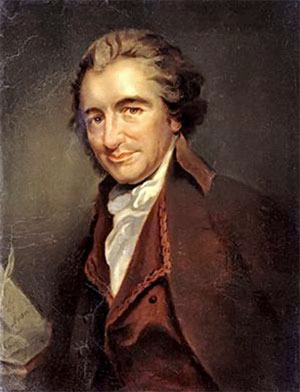
The Declaration of Independence
Lesson Plan
New Ideas in America
- Who was Thomas Paine and what was the importance of Common Sense?
- What are the major ideas of Common Sense?
- What were some of the arguments against declaring independence written in response to Common Sense?

Thomas Paine
Americans could not easily break ties with Britain. Despite their recent hardships, the majority of colonists were raised to love England and respect its monarch.
Fear was another factor. Most colonists were familiar with the harsh abuses the British used on rebels in Ireland. A revolution could bring mob rule, and no one, not even the most rebellious Americans, wanted that. Furthermore, despite their many taxes, times were good in the colonies. In some ways, Americans were even better off than the average Briton.
Yet, there were some terrible injustices the colonists would never forget. Americans were divided about their relationship to England. Arguments for independence were growing. Thomas Paine provided the extra push. His publication Common Sense was an instant best seller. Published in January 1776 in Philadelphia, nearly 120,000 copies were in circulation by April. Paine's arguments were brilliant and straightforward. He argued two main points: 1) America should have independence from England, and 2) the new government should be a democratic republic.
Paine avoided flowery language. He wrote like the people spoke, often quoting the Bible in his arguments. Most people in America had a working knowledge of the Bible, so his arguments rang true. Paine was not religious, but he knew his readers were. He called King George "the Pharaoh of England" and "the Royal Brute of Great Britain." He was even popular in the most rural parts of the American countryside.
Common Sense grew the patriot cause. Paine attacked the rule of George III, and he called for the establishment of a new republic. It made no difference to the readers that Paine was new to America. His writing was actually published anonymously, so many readers didn't know who the author was. Some even attributed it to John Adams, who denied any involvement.
In the end, Paine's prose was common sense. Why should tiny England rule an entire vast continent? How could colonists expect to gain foreign support while being loyal to the British king? How much longer could Americans stand repeated abuse? All of these questions led many readers to one answer as the summer of 1776 drew near.
Thomas Paine is calling King George names: "The Pharaoh of England" and "The Royal Brute of Great Britain." Using these names made it easier for the citizens to identify with Paine's point of view. Think up your own two nicknames for King George that also reflect Paine's opinion of him.
Start page | The Document | A Reading | Signers | Related Information | Jefferson's Account | Declaration House | Declaration Timeline | Rev. War Timeline | More Resources | Lesson Plan |




